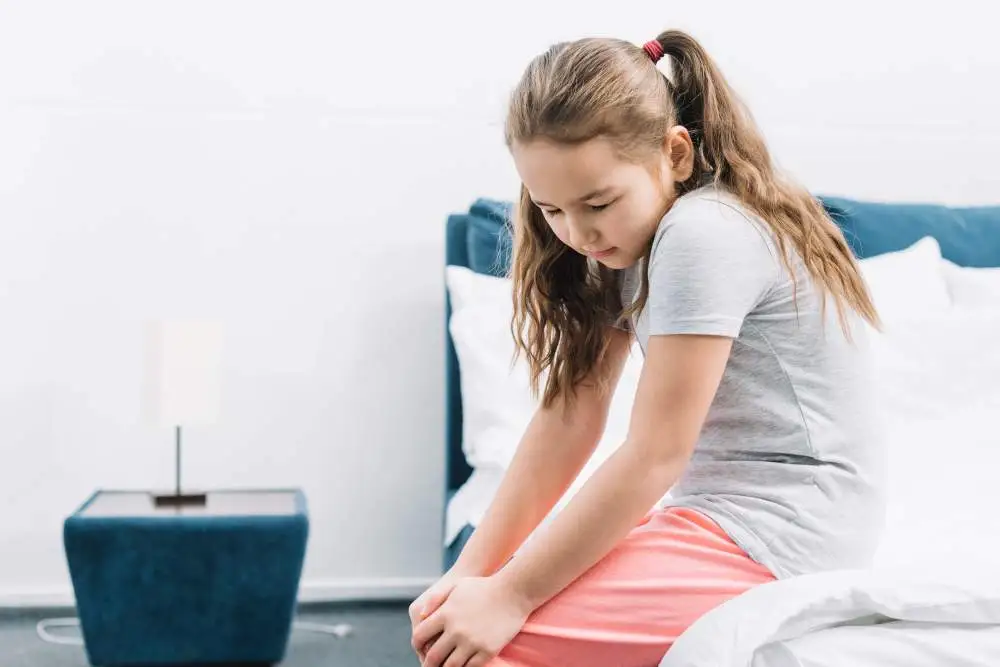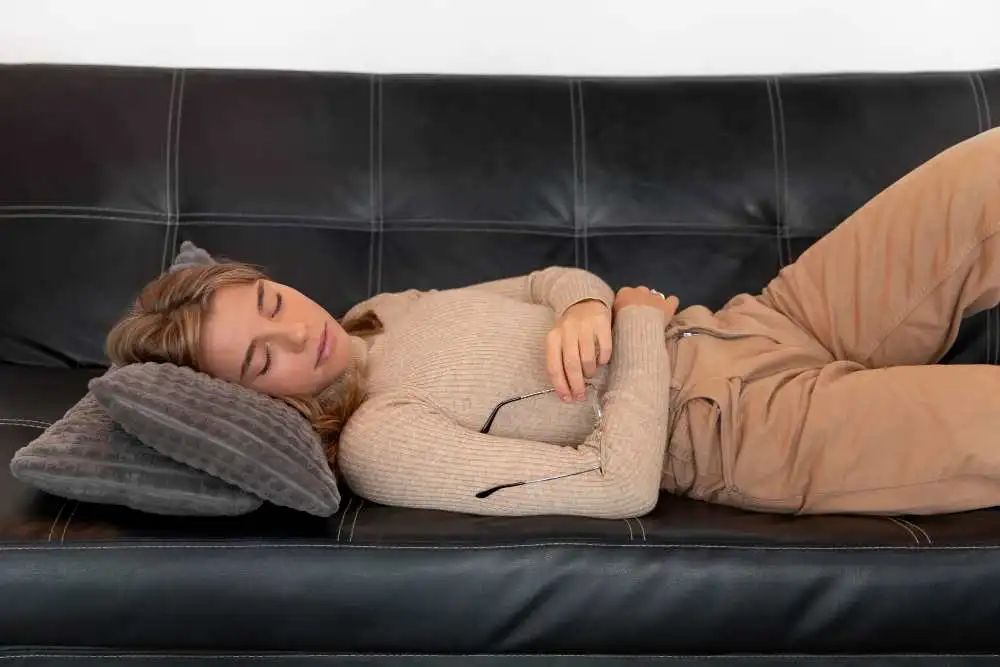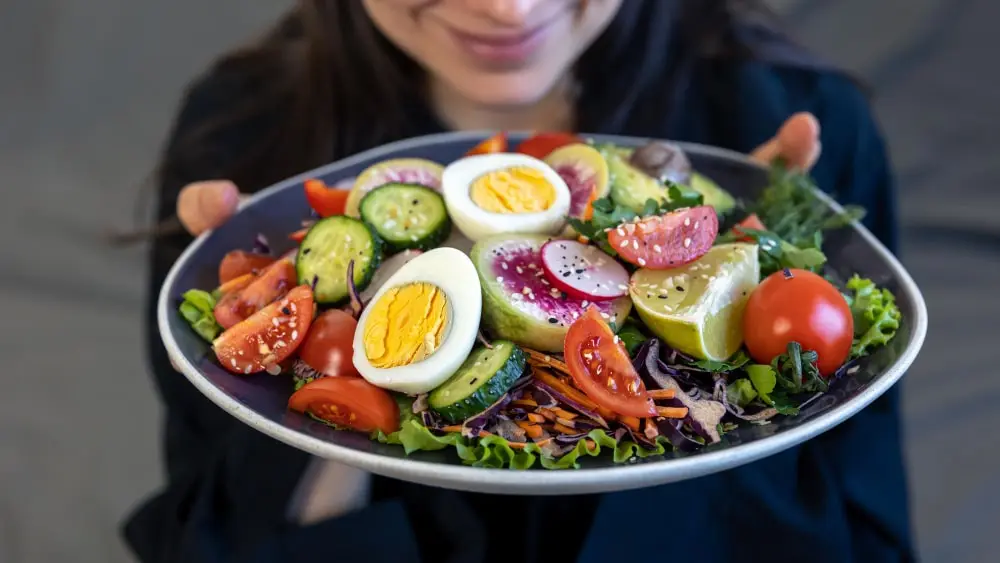There are several things that can cause knee pain Why do my knees hurt when I sleep on my side. One main reason is that lying on top of each other puts pressure on the knees, which can cause pain and soreness. Furthermore, people who have osteoarthritis, bursitis, or tendinitis may feel worse knee pain at night.

In order to ease knee pain when sleeping on your side, try the following:
- To ease and spread the pressure, put a pillow between your knees.
- Choose a cushion with good support, like one made of memory foam or natural rubber.
- Change how you sleep so that you don’t put one knee on top of the other.
- Think about getting a mattress and pillows that can be adjusted that are made for people who sleep on their sides.
- Raise the bottom part of the bed or use a wedge pillow to raise your knees.
- As cold treatment can help reduce inflammation, make sure your bedroom is cool.
How can I sleep on my side without hurting my knees?
Here are some things you can do to sleep on your side without getting knee pain:
Use a Pillow Between Your Knees: Putting a pillow between your knees can help relieve knee pain caused by one knee sitting on top of the other.
Pick the Right Mattress: A supportive mattress, like memory foam or natural rubber, can help lower pressure points and keep your spine in the right place, which may help reduce knee pain.
Change the way you sleep: To keep your knees from hurting, don’t put one on top of the other.
Special Pillows: If you sleep on your side, you might want to look into special pillows. These pillows can be put between your legs to keep your knees from touching, which may help relieve knee pain.
Raise Your Knees: To keep pressure off your hips and ease knee pain, raise the bottom half of the bed or use a wedge pillow to raise your knees.
Keep your sleeping area cool: Cold treatment can help reduce swelling, so knee pain sufferers may benefit from sleeping in a cooler area.
If you follow these tips, you might be able to sleep on your side without as much knee pain and soreness. If knee pain doesn’t go away, you should see a doctor to get a more thorough review and treatment choices.
How do I stop my knees from hurting when I sleep?
Knee pain while you sleep can be very annoying. You can get rid of knee pain at night, though, in a number of ways. Some advice:
Apply Heat or Cold: Putting heat or cold on your knees before bed can help reduce swelling and pain.
Take Medicines: Acetaminophen and other over-the-counter pain killers, also known as nonsteroidal anti-inflammatory drugs (NSAIDs), can help ease knee pain 5. If your knee pain is really bad, your doctor might give you stronger painkillers or suggest other treatments like physical therapy or shots.
Maintain a Healthy Weight: Being overweight can put extra stress on your knees and make knee pain worse. Eating right and working out can help you maintain a healthy weight and ease knee pain.
Stay Active: and deal with your stress. Stretching and working out regularly can help you deal with knee pain and fall asleep faster at night. Managing stress through deep breathing or meditation can also help ease tightness and knee pain.
Massage Your Knee: If you massage your knee before bed, it might help. This method increases blood flow and heats up the spot, which might help ease the pain.
By using these tips, you might be able to lessen knee pain and soreness while you sleep. If knee pain doesn’t go away, you should see a doctor to get a more thorough review and treatment choices.[Why do my knees hurt when I sleep on my side]
What positions hurt your knees?
It’s important to know which poses and actions can make knee pain worse so you can avoid them. The following situations and actions can make knee pain worse:
- When you sleep on your back, the front of your knees are pressed against the mattress, which can be painful and uncomfortable.
- When you sleep with your knees bent or crossed: The ligaments and muscles around your knee are overstretched in this pose, which puts more pressure on the joint.
- Do not cross your legs while sitting. This puts stress on the knee joint and can lead to pain and swelling.
- If you sit for a long time with your knees bent at 90°, the standing force across the joint will be higher, which can cause pain.
- Too much or too little exercise: Knee pain can be caused by both too much or too little exercise.
- When you wear the wrong shoes, like high heels, loose shoes, or shoes that don’t fit right, knee pain can get worse.
- Stepping on rough or hard surfaces: Stepping on rough or hard surfaces can make knee pain worse.
- A lot of impact workouts, like running, fighting, and hopping, can hurt your knees and make knee pain worse.
If you have knee pain, it’s important to live a healthy life and stay away from situations and activities that make the pain worse. If you have knee pain, you should talk to a doctor or nurse to get specific help and treatment choices.[Why do my knees hurt when I sleep on my side]

Sudden intense knee pain while sleeping
Having sudden, severe knee pain while you’re sleeping can be very upsetting. There are many things that can cause knee pain at night, such as an accident, arthritis, bursitis, gout, or tendonitis. Knee pain before bed is common and can be caused by a number of things. Experts say that a type of arthritis is generally the main cause of knee pain.
Osteoarthritis is the most common type of arthritis. It shows up in the joints and is caused by normal wear and tear. You can also hurt any part of your knee, abuse it, or wear the wrong shoes and get knee pain. When knee pain comes on quickly and strongly while you sleep, it may be because of inflammation that gets worse when you lie down. It is important for inflammation to be under control, but when you sleep, your cortisol levels drop. This can make inflammation worse in your knees, making them stiff and painful.
You can try the following things to ease rapid, severe knee pain while you sleep:
Change how you sleep: Putting a small pillow between your knees while you sleep can help ease knee pain caused by one knee sitting on top of the other. If you sleep on your back, put a pillow under your knees to support yourself and keep your knees slightly bent. This will keep your bones from pushing together at the painful, worn-out joint.
Maintain a Healthy Weight: Being overweight can put extra stress on your knees and make knee pain worse. Eating right and working out can help you maintain a healthy weight and ease knee pain.
Consult a Doctor: If knee pain doesn’t go away, you should see a doctor for a more thorough review and treatment choices.
By using these tips, you might be able to lessen rapid, severe knee pain while you sleep. If knee pain doesn’t go away, you should see a doctor to get a more thorough review and treatment choices.
Why would I wake up with knee pain?
Waking up with knee pain can be caused by a number of things, such as underlying problems and the way you slept. This is a thorough look at why you might wake up with knee pain:
Runner’s Knee: Morning knee pain and swelling around the kneecap may indicate runner’s knee. When the kneecap slips out of the trochlear groove, it causes morning agony.
Osteoarthritis: As we age, knee cartilage deterioration from prior traumas or genetic predispositions may cause osteoarthritis. Osteoarthritis may cause creaking joints, pain around the kneecap, along the knee joint line, and on both sides of the knee in the morning.
ACL Injury: A swollen knee that hurts when stepped on or twisted may indicate a serious meniscus or anterior cruciate ligament injury. These injuries may induce morning knee discomfort and need quick medical intervention.
Rheumatoid Arthritis: Awaking with knee discomfort without an accident may indicate rheumatoid arthritis, an inflammatory illness that causes swelling, pain, and stiffness. It may affect both knees with identical symptoms.
Reduced Cortisol Levels: Reduced cortisol levels during sleep may induce knee inflammation, stiffness, and discomfort, particularly for arthritis sufferers.
Bursitis and Tendinitis: Bursitis and tendinitis may induce knee discomfort without damage. Morning knee pain may be caused by bursitis and tendinitis.
Having stiff or sore knees every morning may indicate arthritis. An proper diagnosis and treatment plan need medical attention. Adjusting your sleeping posture, utilizing a comfortable mattress, and administering heat or ice to your knees before bed may also reduce morning knee discomfort.
Which food is not good for knee pain?
Know which foods worsen knee discomfort. Knee discomfort foods to avoid:[Why do my knees hurt when I sleep on my side]
- Sugary foods like candy, soda, and processed baked goods may increase inflammation and worsen knee discomfort.
- Salt or MSG: Excess salt causes fluid retention, inflammation, and joint discomfort. MSG-containing foods increase knee and joint discomfort.
- Large alcohol consumption may interact with knee pain medicines and painkillers. Inflammation from alcohol might increase knee pain.
- Red meat and processed meats like bacon, sausage, ham, and cold cuts are rich in saturated fat. Inflammation from this fat might increase knee discomfort.
- Omega-6 Fatty Acids: Omega-6 fatty acids in certain vegetable oils might aggravate osteoarthritis, an inflammatory knee condition.
- Dairy Products: AGEs are in dairy products. These compounds induce joint discomfort and inflammation.
Avoiding these foods may lessen knee pain. Healthy eating includes fish, veggies, nuts, and whole grains to treat osteoarthritis and other knee issues. If knee discomfort continues, see a doctor for diagnosis and treatment.

Some foods that can help prevent knee pain
If you want to avoid knee pain, you might want to eat the following foods:
- Salmon, mackerel, sardines, trout, and herring are all fatty fish.
- Peanuts, almonds, chia seeds, flax seeds, pine nuts, and other nuts and seeds.
- Berries (like blackberries, blueberries, and strawberries).
- Spinach, kale, collard greens, and arugula are all leafy greens.
- Carrots, sweet potatoes, and butternut squash all have carotenoids in them.
- Green tea has polyphenolic chemicals in it.
- Olive oil, Ginger and garlic, Bone broth, Turmeric.
There are many nutrients, vitamins, and anti-inflammatory qualities in these foods that help keep joints healthy and prevent inflammation. Also, it’s important to stay away from foods that make inflammation worse, like hot foods, sugary foods, red meat, processed meats, and dairy products that contain AGEs (Advanced Glycation Endproducts).[Why do my knees hurt when I sleep on my side]
What is the figure 4 test for knee pain?
To find tears in the popliteomeniscal fascicles, the figure-4 test is used as a diagnostic tool.
In Conclusion
Knee discomfort is prevalent and painful, caused by different musculoskeletal problems. Persistent knee discomfort may anticipate structural development, such as cartilage volume loss and incident and progressive radiographic osteoarthritis. The figure-4 test detects popliteomeniscal fascicle rips, which cause lateral knee discomfort.
This test involves putting the afflicted foot on the contralateral knee. A positive test indicates a peripheral or popliteomeniscal fascicle tear. Knee discomfort may worsen knee structural results, thus early diagnosis and treatment are vital.
Certain meals may worsen knee discomfort, while fatty salmon, olive oil, almonds, and berries reduce inflammation and enhance joint health. Thus, knee pain management must include diagnostic tests, nutritional considerations, and early intervention to minimize its influence on musculoskeletal health.
FAQS By Why do my knees hurt when I sleep on my side
What is the figure-4 test for knee pain?
The figure-4 test detects popliteomeniscal fascicle rips, which cause lateral knee discomfort.
Which foods should be avoided for knee pain?
Sugary meals, salt or MSG, alcohol, red meat, processed meats, and dairy items with AGEs should be avoided for knee discomfort.
What is the role of diet in managing knee pain?
Certain meals may worsen knee discomfort, while fatty salmon, olive oil, almonds, and berries reduce inflammation and enhance joint health.